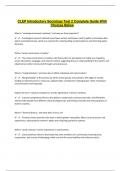CLEP Introductory Sociology Test 2 Complete Guide With
Choices Below
What is "sociological research methods," and why are they important?
✔️✔️ Sociological research methods encompass various techniques used to gather and analyze data
about social phenomena, which are essential for understanding societal patterns and informing policy
decisions.
Define "social construction of reality."
✔️✔️ The social construction of reality is the theory that our perceptions of reality are shaped by
social interactions, language, and cultural context, suggesting that our understanding of the world is not
objective but rather constructed through social processes.
What is "marginalization," and how does it affect individuals and communities?
✔️✔️ Marginalization is the process by which certain groups are pushed to the edges of society,
leading to reduced access to resources, opportunities, and decision-making power, often resulting in
social exclusion and inequality.
Explain the term "cultural competency" and its significance in diverse societies.
✔️✔️ Cultural competency refers to the ability to understand, communicate with, and effectively
interact with people from different cultural backgrounds, promoting inclusivity and reducing biases in
diverse societies.
What is "feminist theory," and what does it focus on?
✔️✔️ Feminist theory examines the ways in which gender inequalities affect social structures and
experiences, advocating for women's rights and critiquing patriarchal systems.
Define "social cohesion" and its importance in communities.
✔️✔️ Social cohesion refers to the bonds that unite members of a community, fostering trust,
cooperation, and a sense of belonging, which are vital for social stability and collective action.
,What is "rhetorical framing," and how does it influence public perception?
✔️✔️ Rhetorical framing is the way information is presented to shape perceptions and interpretations
of issues, influencing public opinion and social discourse by highlighting certain aspects while
downplaying others.
Describe "resilience" in the context of community sociology.
✔️✔️ Resilience in community sociology refers to a community's ability to withstand and recover from
challenges and crises, emphasizing social networks, resources, and adaptive capacities.
What is "social exchange theory," and how does it explain human relationships?
✔️✔️ Social exchange theory posits that social interactions are based on the exchange of resources
and benefits, suggesting that individuals weigh the costs and rewards in relationships to maximize their
gains.
Explain the concept of "urban ecology" in sociology.
✔️✔️ Urban ecology is the study of the relationships between social groups and their urban
environments, examining how urban spaces influence social behavior, interactions, and community
dynamics.
What is "cognitive dissonance theory," and what effects does it have on behavior?
✔️✔️ Cognitive dissonance theory posits that individuals experience discomfort when holding
contradictory beliefs or engaging in conflicting behaviors, leading to changes in attitudes or
rationalizations to restore internal consistency.
Define "collective action" and give an example.
✔️✔️ Collective action refers to the coordinated efforts of a group to achieve a common goal, such as
protests, social movements, or community initiatives aimed at enacting social change.
What is "neoliberalism," and how does it affect social policy?
✔️✔️ Neoliberalism is an economic and political philosophy advocating for free-market principles,
privatization, and reduced government intervention, often affecting social policy by prioritizing
individual responsibility over collective welfare.
,Describe "intersectional feminism" and its focus.
✔️✔️ Intersectional feminism examines how various forms of identity, such as race, class, and
sexuality, intersect with gender to create unique experiences of oppression and privilege, advocating for
a more inclusive feminist movement.
What is "the social contract," and how does it relate to governance?
✔️✔️ The social contract is a philosophical concept suggesting that individuals consent to form
societies and governments in exchange for protection and social order, influencing theories of political
legitimacy and authority.
Sociology is best defined as the scientific study of
A) social problems
B) human personality
C) social interaction
D) human development
E) attitudes and values ✔️✔️C. Sociology studies human interaction, both in small groups and in larger
setting, and the results of that interaction, such as groups, organizations, institutions, and nations.
Sociology developed as a separate discipline in the nineteenth century in response to
A) the growth of socialism
B) the spread of colonialism
C) a desire to promote greater equality
D) the growth of industrial society
E) disenchantment with psychology ✔️✔️D. The Industrial Revoluton in Europe brought about the
decline of traditional agricultural societies and the rapid growth of cities. The social dislocations that
resulted from this change stimulated thinkers to consider the nature of social order and social change,
and the outcome was the emergence of sociology as a separate discipline.
The German sociologist Max Weber is best known for his study
A) Street Corner Society
B) The Division of Labor in Society
, C) The Human Group
D) The protestant Ethic and the Spirit of Capitalism
E) The Theory of the Leisure Class. ✔️✔️D. In The Protestant Ethic and the Spirit of Capitalism Weber
studied the influence of the religious changes of the Reformation on the growth of capitalism in Europe.
In his writings, the French sociologist Emile Durkheim placed great emphasis on the concept of
A) class conflict
B) social solidarity
C) rationalization
D) social mobility
E) reference groups ✔️✔️B. In his study of suicide, Durkheim explained how the decline of social
solidarity in modern society has led to the growth of anomie (normlessness) and associated social
problems such as suicide.
In his theory, Karl Marx explained that conflict between industrial workers and the owners of industry
was
A) likely to decline in future years.
B) usually harmful to social institutions
C) an inevitable consequence of capitalism
D) of little importance to social change
E) a rate occurrence in modern societies ✔️✔️C. Marx concluded that conflict between workers and
owners was an intrinsic feature of capitalist societies.
The research method that relies on interviews with a randomly selected sample of people is known as
A) survey research
B) participant observation
C) content analysis
D) experimentation
E) exploratory research ✔️✔️A. Survey research is based on data gathered by personal interviews or
written questionnaires administered to a random sample of a larger population.




